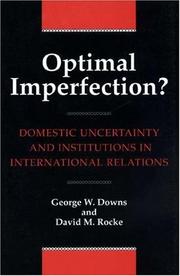| Listing 1 - 2 of 2 |
Sort by
|

ISBN: 0691225206 0691044600 Year: 1996 Publisher: Princeton, N.J. : Princeton University Press,
Abstract | Keywords | Export | Availability | Bookmark
 Loading...
Loading...Choose an application
- Reference Manager
- EndNote
- RefWorks (Direct export to RefWorks)
"Domestic politics matters" has become a rallying cry for international relations scholars over the past decade, yet the question still remains: Just how does it matter? In this book, George Downs and David Rocke argue that an important part of the international impact of domestic politics springs from the institutional responses to its many uncertainties. This impact is due not so much to the errors in judgment these uncertainties can cause as to the strategic and institutional consequences of knowing that such errors are possible. The heart of the book is its formal analysis of how three kinds of domestic uncertainty have shaped international relations through their influence on three very different institutions. One chapter deals with the decision rules that citizens create to cope with uncertainty about the quality of their representation, and how these can lead to the paradoxical "gambling for resurrection" effect. Another chapter describes the extent to which the weak enforcement provisions of GATT can be understood as a mechanism to cope with uncertain but intermittent interest group demands for protection. The third chapter looks at the impact of uncertainty on the creation, survival, and membership of multilateral regulatory institutions, such as the Montreal Protocol and EU, when some states question the capacity of other states to meet their treaty obligations.
GATT. --- Theory. --- EU. --- Domestic politics. --- International politics. --- Abreu, Dilip. --- Adventurism. --- Asymmetric information. --- Balance of Power. --- Bargaining costs. --- Bayesian learning. --- Bilateral agreement. --- Brinkmanship. --- Capability. --- Capacity change. --- Certainty effect. --- Chief executive. --- Compensation. --- Compliance. --- Contraction. --- Coordination regime. --- Cournot equilibrium. --- Democracy. --- Deterrence. --- Diversionary war. --- Domino effect. --- Election sanction. --- Enforcement. --- Environmental regulation. --- Equilibrium refinements. --- Fearon, Jame. --- Fundamental attribution bias. --- Gambling for resurrection. --- Gibbons, Robert. --- Glorious Revolution. --- Haas, Peter. --- Hegemonic stability game. --- Humes, Brian. --- Imperfect information. --- Information uncertainty. --- Institutionalist tradition. --- Interest groups. --- Jervis, Robert. --- Kahneman, Daniel. --- Kreps, David. --- Lafay, Jean-Dominique. --- Loss aversion. --- Median voter. --- Multilateral agreement. --- Multilateral institution. --- Multipolarity. --- New economics of organization. --- Nontariff barriers. --- Osborne, Martin. --- Pareto-suboptimal solutions. --- Perfect information. --- Preventive wars. --- Protectionism.
Book
ISBN: 0691161593 1400852706 9781400852703 9781322158419 132215841X 9780691161587 0691161585 9780691161594 Year: 2014 Publisher: Princeton, New Jersey
Abstract | Keywords | Export | Availability | Bookmark
 Loading...
Loading...Choose an application
- Reference Manager
- EndNote
- RefWorks (Direct export to RefWorks)
Does growing economic interdependence among great powers increase or decrease the chance of conflict and war? Liberals argue that the benefits of trade give states an incentive to stay peaceful. Realists contend that trade compels states to struggle for vital raw materials and markets. Moving beyond the stale liberal-realist debate, Economic Interdependence and War lays out a dynamic theory of expectations that shows under what specific conditions interstate commerce will reduce or heighten the risk of conflict between nations.Taking a broad look at cases spanning two centuries, from the Napoleonic and Crimean wars to the more recent Cold War crises, Dale Copeland demonstrates that when leaders have positive expectations of the future trade environment, they want to remain at peace in order to secure the economic benefits that enhance long-term power. When, however, these expectations turn negative, leaders are likely to fear a loss of access to raw materials and markets, giving them more incentive to initiate crises to protect their commercial interests. The theory of trade expectations holds important implications for the understanding of Sino-American relations since 1985 and for the direction these relations will likely take over the next two decades.Economic Interdependence and War offers sweeping new insights into historical and contemporary global politics and the actual nature of democratic versus economic peace.
POLITICAL SCIENCE / Peace. --- POLITICAL SCIENCE / International Relations / Diplomacy. --- HISTORY / World. --- POLITICAL SCIENCE / Government / International. --- POLITICAL SCIENCE / International Relations / General. --- Economic history --- Military history, Modern. --- Natural resources --- Competition, International. --- War --- Modern military history --- National resources --- Resources, Natural --- Resource-based communities --- Resource curse --- International competition --- World economics --- International relations --- International trade --- Causes of war --- Armed conflict (War) --- Conflict, Armed (War) --- Fighting --- Hostilities --- Wars --- Military art and science --- Peace --- Political aspects. --- Causes. --- Economic aspects --- History. --- American oil embargo. --- China. --- Cold War. --- Europe. --- European great powers. --- Japanese economy. --- Japanese foreign policy. --- Manchuria. --- Nazism. --- Pacific War. --- Russo-Japanese War. --- Shidehara Kijuro. --- Sino-American relations. --- Taisho democracy. --- USЃhinese relations. --- USЊapanese relations. --- USГoviet relations. --- World War I. --- World War II. --- case study research. --- causal theories. --- colonial territory. --- commerce. --- commercial expectations. --- conflict. --- democratic peace. --- economic interdependence. --- economic peace. --- existing literature. --- existing scholarship. --- future probabilities. --- future trade. --- global politics. --- global war. --- great power politics. --- great power system. --- great powers. --- historical analysis. --- imperial expansion. --- interdependence. --- international political economy. --- international relations. --- interstate commerce. --- investment. --- large-N quantitative research. --- leader expectations. --- liberalism. --- modern conflict. --- nineteenth-century geopolitics. --- political control. --- preventive wars. --- quantitative analysis. --- rare events research. --- realism. --- third-party territories. --- trade expectations theory. --- trade expectations. --- trade. --- war.
| Listing 1 - 2 of 2 |
Sort by
|

 Search
Search Feedback
Feedback About
About Help
Help News
News